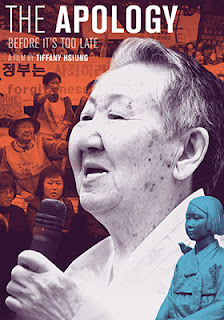Icarus Films has turned
its attention to the post-Labor Day period with two new foreign-language
imports that will be available on DVD during the month of September.
Up first on Sept. 5 is documentary
filmmaker Tiffany Hsiung’s The Apology, the award-winning look
at the story of “comfort women” used by the Imperial Japanese Army during World
War II.
Wisely, Hsiung avoids
trying to report on the tens of thousands of young women who were made sex
slaves during the war, and instead focuses on the personal stories of three of
these women. In a sense the clock is
ticking and time is running short on sharing the events, the shame and the terror
that they’ve kept to themselves throughout the years that followed the war. Hsiung recognized this and has devoted the
time and energy to document what happened.
Referred to as Grandma
Gil (South Korean), Grandma Adela (The Philippines) and Grandma Cao (China), they
have sought in vein to receive a formal apology from the Japanese government (itself
too ashamed to admit publicly what was done).
To move that forward, Hsiung filmed each in turn, who share their
experiences; to document for all time this sordid page from the nearly forgotten
history of the war.
 Bit by bit, fragments
of memories, a piece here, a remembrance there … the horror of it all comes
together … we learn with Tiffany Hsiung as she learns, through trust and
contact with each of the women what they went through. It is in that learning process that film
achieves its greatest strength.
Bit by bit, fragments
of memories, a piece here, a remembrance there … the horror of it all comes
together … we learn with Tiffany Hsiung as she learns, through trust and
contact with each of the women what they went through. It is in that learning process that film
achieves its greatest strength.
The Apology is presented in Korean, Tagalog, Mandarin,
Japanese and English, with English subtitles.
Brazilian documentary
filmmaker Eryk Rocha takes a look at Cinema Novo film movement — a South
American equivalent to the French New Wave — in his film of the same name, Cinema
Novo. Icarus Films has tabbed
Sept. 19 for the DVD rollout.
 Beginning in the 1960s
there was a movement among certain filmmakers — such as Glauber Rocha (Rocha’s
father and acknowledged founder of the movement), Joaquim Pedro de Andrade and Carlos
Diegues — who wanted to be more expressive in the subjects, especially
politically, that were being produced, which ran counter to the mainstream,
which produced mainly musicals and variety films … and Hollywood-styled cookie
cutter productions.
Beginning in the 1960s
there was a movement among certain filmmakers — such as Glauber Rocha (Rocha’s
father and acknowledged founder of the movement), Joaquim Pedro de Andrade and Carlos
Diegues — who wanted to be more expressive in the subjects, especially
politically, that were being produced, which ran counter to the mainstream,
which produced mainly musicals and variety films … and Hollywood-styled cookie
cutter productions.
The film opened at Cannes
last year and won the Golden Eye for Best Documentary, worked the international
film festival circuit and is slated for a limited arthouse run in August.
For students of film —
who are often very familiar with the French New Wave — Cinema Novo should be
considered must-see viewing.
The DVD
release on Sept. 19 gives them, and the rest of us, the opportunity to explore
this unique side street of filmmaking history.
Cinema Novo is presented
in Portuguese with English subtitles.


No comments:
Post a Comment